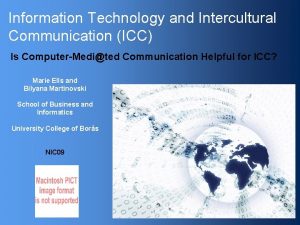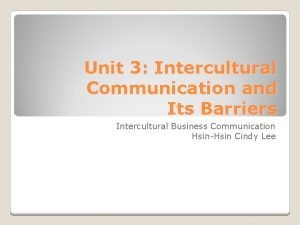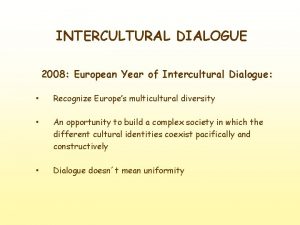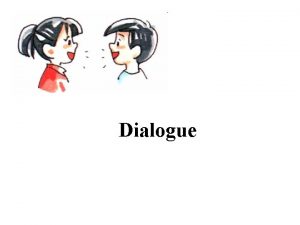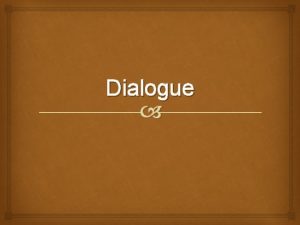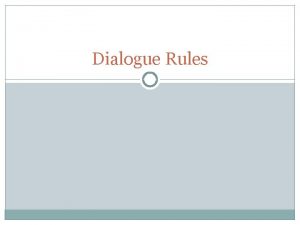Intercultural dialogue Intercultural dialogue is an open and










- Slides: 10

Intercultural dialogue “Intercultural dialogue is an open and respectful exchange of views between individuals and groups belonging to different cultures that leads to a deeper understanding of the other’s global perception. ”

Continue… � Dialogue is considered as a rational conversation between two or more persons. The word is derived from the Greek dialogos, which in turn comes from dialegethai (to converse). Dialegethai comes from dia (through, across) and legein (to speak). � Civil society is an essential part of the proper functioning of the state, helping to initiate, promote, and strengthen comprehensive and objective dialogue between governments and their people.

Objectives The objective of intercultural dialogue is to learn to live together peacefully and constructively in a multicultural world and to develop a sense of community and belonging. � To share visions of the world, to understand learn from those that do not see the world with the same perspective we do; � To identify similarities and differences between different cultural traditions and perceptions; � To achieve a consensus that disputes should not be resolved by violence; � To help manage cultural diversity in a democratic manner, by making the necessary adjustments to all types of existing social and political arrangements; � To bridge the divide between those who perceive diversity as a threat and those who view it as an enrichment; � To share best practices particularly in the areas of intercultural dialogue, the democratic management of social diversity and

Importance of Cultural Diversity � Cultural diversity is important because our country, workplaces, and schools increasingly consist of various cultural, racial, and ethnic groups. We can learn from one another, but first we must have a level of understanding about each other in order to facilitate collaboration and cooperation. � Diversity can be defined as people coming together from different races, nationalities, religions and sexes to form a group, organization or community. � Most people view diversity as a good thing because it gives people the chance to experience different things outside of what they are normally accustomed to. Diversity in America is openly viewed as a beneficial bacterium, so many backgrounds and not knowing which ones are good and which ones are bad.

Continue…. . 1. Diversity creates richness in opinion. Some problems cannot be solved by a homogenous group of people. The complexity of challenges facing the world today requires the input people from different cultural backgrounds if we are to succeed � 2. Diversity makes us compassionate about others When we interact and try to understand others, we will not judge them. This instead makes us compassionate about others. We are then able to love and help one another. Compassion allows us to empathize with others and realize that all human beings are the same � 3. Diversity is a growing trend Today there is no country in the world that has only natives living there. Each and every day, millions of people are moving from a part of the world to another. Most people are in such of better opportunities, education and lifestyle � 4. Diversity opens up new market opportunities Through diversity, entrepreneurs have been able to reach new markets. Today we have multinationals setting up offices in different parts of the world of which it would not be possible without embracing diversity �

Continue. . � Intercultural dialogue was valuable in maintaining international peace and security, and for that reason, it was essential to treat all cultures and faiths with equal respect, strengthen intercultural dialogue in an inclusive spirit, and settle conflicts by peaceful means, � Intercultural Dialogue Crucial in Preventing, Resolving Conflicts � Intercultural dialogue] could promote reconciliation in the aftermath of conflict and could also introduce moderate voices into polarized debates, ” � intercultural dialogue is to learn to live together peacefully and constructively in a multicultural world and to develop a sense of community and belonging. Intercultural dialogue can also be a tool for the prevention and resolution of conflicts by enhancing the respect for human rights, democracy and the rule of law.

Continue… � Intercultural dialogue is, essentially, the exchange of views and opinions between different cultures. � Unlike multiculturalism, where the focus is on the preservation of separate cultures, intercultural dialogue seeks to establish linkages and common ground between different cultures, communities, and people, promoting understanding and interaction.

Role of civil society in inter-cultural dialogue � Civil society is an essential part of the proper functioning of the state, helping to initiate, promote, and strengthen comprehensive and objective dialogue between governments and their people. In this way, civil society fosters conflict resolution, advances human rights, and promotes better democratization processes. Because of its flexible, multidimensional, and non-rigid structure, civil society has the capability to adapt to rapid global changes. � Civil society considered as a community of citizens linked by common interests and collective activity.

Continue…. � Human Social lives revolve around three component of society , state economy and civil society. These three sectors are collaborative , cooperative and thus contribute in the smooth running of society. � Civil society play a constructive role in peacebuilding and to create a just society. � Role of civil society is always to provide solution of problems and guideline for creating harmony in society.

� Civil society is an emerging arena for social and political change in Pakistan. It includes a vast array of organizations and associations that represent the interests of the country’s population. � Some of them have a long history in Pakistan, such as trade unions, bar associations, teacher’s associations, peasant organizations, student groups, and charity organizations.
 Intercultural travel
Intercultural travel Open innovation open science open to the world
Open innovation open science open to the world Congratulation or congratulations
Congratulation or congratulations Mary olson open dialogue
Mary olson open dialogue Technology and intercultural communication
Technology and intercultural communication Normally open timer symbol
Normally open timer symbol Open hearts open hands
Open hearts open hands Barriers of communication stereotyping
Barriers of communication stereotyping Managing intercultural conflict effectively
Managing intercultural conflict effectively Intercultural fluency
Intercultural fluency Intercultural conflict definition
Intercultural conflict definition




